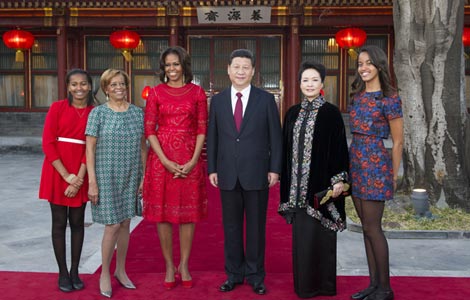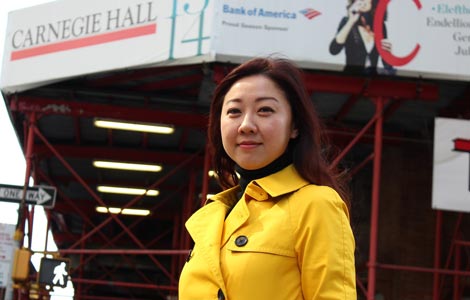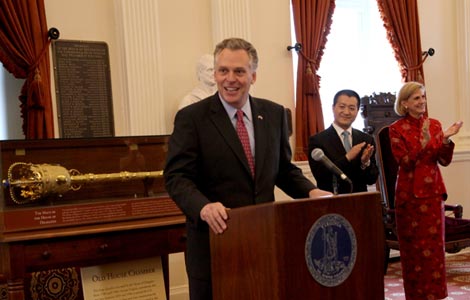British Columbia: Issuing 'dim sum' boosts China ties
Updated: 2014-03-21 13:15
By Michael Barris in New York (China Daily USA)
|
||||||||
|
Teresa Wat, the Canadian province of British Columbia's international trade minister and minister responsible for Asia-Pacific strategy and multiculturalism, is in New York as part of an Eastern US swing aimed at attracting investment to Canada's most ethnically diverse province - and closest geographically to China. Hu Haidan / China Daily |
It was a risky move by a government seeking to impress China. It paid off in securing the nation's friendship, a key move in attracting Chinese investment.
Last November, the government of the Canadian province of British Columbia became the first foreign government to issue an offshore bond denominated in yuan. The issuance of the one-year bond - nicknamed the "dim sum" bond for the Chinese cuisine that involves serving a variety of small delicacies - raised an unexpectedly high 2.5 billion yuan ($405.1 million).
The high-profile step marked a milestone for China in the internationalization of its currency, a key issue in its financial reform plan.
"I'm sure the Chinese government always will remember it," Teresa Wat, BC's International Trade Minister and minister responsible for Asia-Pacific strategy and multiculturalism, told China Daily in an interview. She was in New York as part of an Eastern US swing aimed at attracting investment to Canada's westernmost and most ethnically diverse province - the closest in proximity to China.
BC Finance Minister Mike de Jong said officials had intended to raise only 500 million yuan with the bond offering but demand exceeded expectations. Central banks and foreign institutions snatched up 62 percent of the bonds while fund asset managers bought 18 percent. Investors in Hong Kong Special Administrative Region took 46 percent, and US investors grabbed 40 percent. The bonds carried a yield of 2.25 percent - 10 to 15 basis points lower than bonds sold by the Chinese government, according to offering manager HSBC.
Dim sum bonds appeal to foreign investors who seek exposure to yuan-denominated assets, but are restricted by China's capital controls from investing in domestic Chinese debt. Until BC issued its bond, the issuers of dim sum bonds had been largely entities based in the Chinese mainland or Hong Kong, and occasionally foreign companies.
Helping China "leaves a good impression", Wat said during the interview at a Manhattan hotel. By being "bold and risky and creative enough to break it open", the province can attract more Chinese investment to Canada, and particularly British Columbia and the Vancouver area, she said.
China "has been very active in their financial world for many years, and yet how come not even one government had thought about issuing a bond in RMB?" Wat asked. "Do they have confidence in the RMB? That tells a lot. We at the BC government really have confidence in the RMB, we know one day it will thrive - and sure enough it did take off successfully." The province plans to hold another dim sum bond offering "when opportunity arises", Wat said.
Jim Hopkins, assistant deputy minister of British Columbia's finance ministry, said the province wanted to be an early entrant in the offshore yuan market, which is expected to grow rapidly and benefit participants in terms of lower trading cost with China and more diversified financing and investment channels.
Since 2001, BC's goods exports to China have skyrocketed 691 percent, according to the BC government, to $5.75 billion in 2012.
The president and CEO of a multicultural broadcasting company, Wat has represented the Vancouver-area electoral district of Richmond Centre as a member of the BC Liberal Party since she was elected to the legislative assembly in 2013. Last June, Premier Christy Clark appointed Wat as Minister of International Trade, and Minister Responsible for the Asia Pacific Strategy and Multiculturalism.
Wat said she wants to tighten BC's bond with China by "leveraging" its diverse population.
In 2011, Canada had a foreign-born population of about 6.8 million, representing 20.6 percent of the total population, according to Census data. From 2006 to 2011, Asia was Canada's largest source of immigrants.
"Immigrants to Vancouver still maintain their personal, cultural, family, business and government relationship," the Hong Kong-born Wat said. The community's ties to overseas markets "can turn into meetings" that eventually lead to deals, she said.

Relationships are particularly important in doing business with China. "When you are dealing with a Chinese businessman, you have at least seven or eight meetings before you can strike a business deal," Wat said. "That's something a lot of American business people don't really get - you really have to invest time. It's like a marriage - you have to try to understand each other. And you have to nurture that relationship even after you become friends."
Growing up, Wat's heroine was Hua Mulan - the legendary girl who takes her father's place in the army to fight invaders. It is a story of feminism, "since the female traditionally never gets a place in Chinese society," Wat said. Hua Mulan "shared a great wish of helping her father... doing the things a female can't do - that's why she's my heroine".
Her admiration of Hua Mulan and the message she absorbed from her parents still drive her today. "Even if you are a woman, you have to be independent, you have to be able to look after yourself, you can't depend on getting married to a rich husband", she said.
michaelbarris@chinadailyusa.com
(China Daily USA 03/21/2014 page2)

 US first lady shows character during maiden visit to China
US first lady shows character during maiden visit to China
 Icebreaker heads for southern Indian Ocean for missing jet
Icebreaker heads for southern Indian Ocean for missing jet
 A long musical journey to Carnegie Hall
A long musical journey to Carnegie Hall
 Balancing an egg on end during vernal equinox
Balancing an egg on end during vernal equinox
 Los Angeles County Air Show
Los Angeles County Air Show
 Don't need a bed to sleep tight
Don't need a bed to sleep tight
 Peng Liyuan meets with Michelle Obama
Peng Liyuan meets with Michelle Obama
 Virginia on the road to China
Virginia on the road to China
Most Viewed
Editor's Picks

|

|

|

|

|

|
Today's Top News
US first lady shows character during visit
Xi sets off on first European tour
Beijing beefs up hunt for missing jet
CNPC taps new gas reservoir
China Southern announces Guangzhou-NY flight
Michelle Obama meets with students in Beijing
Alibaba buys stake in Silicon Valley
A long musical journey to Carnegie Hall
US Weekly

|

|









